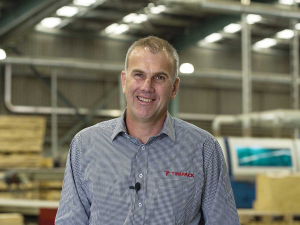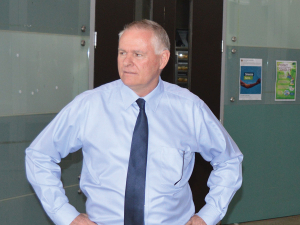Waikato company Timpack is playing a key role helping businesses move their essential goods around NZ and the world.
It's no secret that the agriculture sector has continued to be the engine room for New Zealand’s economy during the past six months of turmoil.
Our farmers, farm staff, processors and exporters worked during the lockdowns to keep milk, meat, vegetables and fruit flowing to consumers both here and overseas.
Timpack has played a key role helping businesses move their essential goods around NZ and export them to the world.
The company is one of New Zealand’s largest wooden pallet and container manufacturers, operating in Hamilton since 1984 and expanding capacity to seven sites throughout New Zealand.
Employing 200 staff, Timpack makes a million items of wooden packaging annually.
Dairy processors and kiwifruit packers are two of their biggest clients.
Its team of 200 staff quite literally takes business places with production of more than a million items of wooden packaging annually.
Timpack managing director Alan Walters notes that the humble wooden pallet is used to transport goods and touches nearly every product we consume at some point in its life.
From dairy to horticulture to meat and metal and packaging, more than 500 businesses around the country count on Timpack. Around three quarters of Timpack’s customers are essential businesses, primarily in the food industry but including other products such as hospital beds. Lockdown hit during the busy picking and packing season for kiwifruit and apples, requiring a large amount of pallets and bins in a very short time period.
“Preparation for lockdown included checking our supply chain, which includes nails from China, as well as adapting business practices with changes to shifts, break times and working practices to ensure the health and safety of our staff and to meet social distancing requirements.
“The only real issue was timber supply from domestic sawmills, which surprisingly were not considered essential business and were forced to shut,” says Walters.
“With some juggling, prioritising and outsourcing, we did everything in our means to meet demand through lockdown, but without ongoing timber supply some of our customers felt the effects of the shortages.”
Walters points out that the situation could have become much more serious had lockdown continued, with major disruptions to our primary industries.
Walters is president of the New Zealand Wooden Pallet & Container Association and said other members faced a similar predicament, with the pallet industry in New Zealand requiring an estimated 15,000m3 of timber every month. That roughly equates to 375 truck and trailer loads every month. During lockdown Walters made a plea on behalf of the industry for the Government to allow sawmills and their supply chains to operate during Level 4 lockdown.
This was partially met with the reopening of some sawmills to process sawn logs but not the fresh cutting of logs.
On behalf of the industry he is calling on the Government to proactively address the issue so that sawmills and their supply chains can operate should New Zealand be placed into Level 4 again.
“Pallets are a vital but often overlooked part of the supply chain. It’s time to put them in the spotlight.
“Allowing sawmills and their supply chains to operate in any future lockdown would enable an uninterrupted flow of pallets which are critical to the nation’s essential industries.”
Essential service
Alan Walters says Timpack is proud to be associated with the agriculture sector. Fonterra and Zespri are two of its biggest clients.
He says the agriculture sector has been crucial to NZ’s economy during Covid.
“We were happy to play our part in supplying wooden packaging to the industry,” he says.
“Unlike some other sectors, agriculture cannot defer milking cows or picking fruit. There will be animal welfare issues for cows and fruit will rot on trees.”
During the first lockdown, kiwifruit harvest was at its peak and wooden pallet demand was at its highest among packhouses.


















